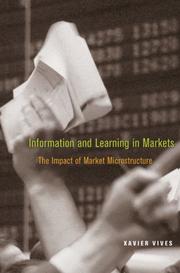| Listing 1 - 10 of 53 | << page >> |
Sort by
|
Book
ISBN: 9780199566358 0199566356 Year: 2009 Publisher: Oxford Oxford University Press
Abstract | Keywords | Export | Availability | Bookmark
 Loading...
Loading...Choose an application
- Reference Manager
- EndNote
- RefWorks (Direct export to RefWorks)
A volume that takes stock and looks ahead on the development and implementation of competition policy in the European Union fifty years after the Treaty of Rome. Competition policy has emerged as a key policy in the EU with competition acting as the driving force for economic efficiency and the welfare of citizens. Case law has been established to control and prevent anti-competitve behavior, state aid control has consolidated and evolved towards a more economic approach, and the authority of the EC and the judicial review of the Court of the First Instance (CFI) and the European Court of Justice (ECJ) are firmly etsablished. The book provides an economic approach to competition policy and reflects the main areas of interest, open issues and progress in the area. The volume examines the design of competition policy institutions, the evolution of the implementation of competition policy and its convergence or divergence with US practice, restrictive practices, cartels, abuse of dominance, merger control and state aids. The volume also analyses the interaction of competition policy and regulation, and studies its application to telecoms, banking and energy sectors. All chapters are written by leadfing specialists combining theoretical with practical knowledge and discussing the underpinings of the application of law.
Book
ISBN: 9780691171791 0691171793 Year: 2016 Publisher: Princeton Princeton University Press
Abstract | Keywords | Export | Availability | Bookmark
 Loading...
Loading...Choose an application
- Reference Manager
- EndNote
- RefWorks (Direct export to RefWorks)
"Does too much competition in banking hurt society? What policies can best protect and stabilize banking without stifling it? Institutional responses to such questions have evolved over time, from interventionist regulatory control after the Great Depression to the liberalization policies that started in the United States in the 1970s. The global financial crisis of 2007-09, which originated from an oversupply of credit, once again raised questions about excessive banking competition and what should be done about it. Competition and Stability in Banking addresses the critical relationships between competition, regulation, and stability, and the implications of coordinating banking regulations with competition policies. Xavier Vives argues that while competition is not responsible for fragility in banking, there are trade-offs between competition and stability. Well-designed regulations would alleviate these trade-offs but not eliminate them, and the specificity of competition in banking should be accounted for. Vives argues that regulation and competition policy should be coordinated, with tighter prudential requirements in more competitive situations, but he also shows that supervisory and competition authorities should stand separate from each other, each pursuing its own objective. Vives reviews the theory and empirics of banking competition, drawing on up-to-date analysis that incorporates the characteristics of modern market-based banking, and he looks at regulation, competition policies, and crisis interventions in Europe, the United States, as well as emerging economies. Focusing on why banking competition policies are necessary, Competition and Stability in Banking examines regulation's effect on the industry's efficiency and effectiveness."--
Private finance --- Banks and banking. --- Banks and banking --- Competition. --- Agricultural banks --- Banking --- Banking industry --- Commercial banks --- Depository institutions --- Finance --- Financial institutions --- Money --- Competition (Economics) --- Competitiveness (Economics) --- Economic competition --- Commerce --- Conglomerate corporations --- Covenants not to compete --- Industrial concentration --- Monopolies --- Open price system --- Supply and demand --- Trusts, Industrial --- Government policy. --- 333.139.2 --- 333.106 --- Bankcontrole en -reglementering. Reglementering van het bankberoep. --- Kost, rendabiliteit en concurrentie in de banken. --- Competition --- Economic aspects --- Bankcontrole en -reglementering. Reglementering van het bankberoep --- Kost, rendabiliteit en concurrentie in de banken --- Government policy

ISBN: 0262220601 026272040X 9780262220606 9780262720403 Year: 2001 Publisher: Cambridge : M.I.T. Press,
Abstract | Keywords | Export | Availability | Bookmark
 Loading...
Loading...Choose an application
- Reference Manager
- EndNote
- RefWorks (Direct export to RefWorks)
Competition --- Game theory --- Oligopolies --- Pricing --- concurrentie --- prijsbeleid --- prijsvorming --- speltheorieën --- 330.104 --- 338.5 --- 518.5 --- Games, Theory of --- Theory of games --- Mathematical models --- Mathematics --- Competition (Economics) --- Competitiveness (Economics) --- Economic competition --- Commerce --- Conglomerate corporations --- Covenants not to compete --- Industrial concentration --- Monopolies --- Open price system --- Supply and demand --- Trusts, Industrial --- Price policy --- Price policy, Industrial --- Retail pricing --- Marketing --- Economic concentration --- Monopolies, Partial --- Partial monopolies --- Competition, Imperfect --- Interorganizational relations --- Micro-economie --- Prijzen --- Operationeel onderzoek. Speltheorie --- Economic aspects --- Microeconomics --- Operational research. Game theory --- Prices --- Competition. --- Oligopoles. --- Prix --- Concurrence. --- Jeux, Theorie des. --- Fixation. --- Game theory. --- Oligopolies. --- Pricing. --- Concurrence --- Théorie des jeux --- Prix - Fixation. --- Oligopoles

ISBN: 9780691127439 0691127433 0691145962 128245840X 140082950X 9786612458408 Year: 2008 Publisher: Princeton : Princeton University Press,
Abstract | Keywords | Export | Availability | Bookmark
 Loading...
Loading...Choose an application
- Reference Manager
- EndNote
- RefWorks (Direct export to RefWorks)
The ways financial analysts, traders, and other specialists use information and learn from each other are of fundamental importance to understanding how markets work and prices are set. This graduate-level textbook analyzes how markets aggregate information and examines the impacts of specific market arrangements--or microstructure--on the aggregation process and overall performance of financial markets. Xavier Vives bridges the gap between the two primary views of markets--informational efficiency and herding--and uses a coherent game-theoretic framework to bring together the latest results from the rational expectations and herding literatures. Vives emphasizes the consequences of market interaction and social learning for informational and economic efficiency. He looks closely at information aggregation mechanisms, progressing from simple to complex environments: from static to dynamic models; from competitive to strategic agents; and from simple market strategies such as noncontingent orders or quantities to complex ones like price contingent orders or demand schedules. Vives finds that contending theories like informational efficiency and herding build on the same principles of Bayesian decision making and that "irrational" agents are not needed to explain herding behavior, booms, and crashes. As this book shows, the microstructure of a market is the crucial factor in the informational efficiency of prices. Provides the most complete analysis of the ways markets aggregate information Bridges the gap between the rational expectations and herding literatures Includes exercises with solutions Serves both as a graduate textbook and a resource for researchers, including financial analysts
Stock exchanges --- 332.642 --- 305.6 --- 330.2 --- AA / International- internationaal --- Bulls and bears --- Commercial corners --- Corners, Commercial --- Equity markets --- Exchanges, Securities --- Exchanges, Stock --- Securities exchanges --- Stock-exchange --- Stock markets --- Capital market --- Efficient market theory --- Speculation --- Risicotheorie, speltheorie. Risicokapitaal. Beslissingsmodellen --- Economische analyse en research. Theorie van de informatie. --- Stock exchanges. --- Market research --- Economische analyse en research. Theorie van de informatie
Book
ISBN: 1400880904 9781400880904 0691171793 9780691171791 9780691210032 0691210039 Year: 2016 Publisher: Princeton, NJ : Princeton University Press,
Abstract | Keywords | Export | Availability | Bookmark
 Loading...
Loading...Choose an application
- Reference Manager
- EndNote
- RefWorks (Direct export to RefWorks)
Does too much competition in banking hurt society? What policies can best protect and stabilize banking without stifling it? Institutional responses to such questions have evolved over time, from interventionist regulatory control after the Great Depression to the liberalization policies that started in the United States in the 1970s. The global financial crisis of 2007-2009, which originated from an oversupply of credit, once again raised questions about excessive banking competition and what should be done about it. Competition and Stability in Banking addresses the critical relationships between competition, regulation, and stability, and the implications of coordinating banking regulations with competition policies.Xavier Vives argues that while competition is not responsible for fragility in banking, there are trade-offs between competition and stability. Well-designed regulations would alleviate these trade-offs but not eliminate them, and the specificity of competition in banking should be accounted for. Vives argues that regulation and competition policy should be coordinated, with tighter prudential requirements in more competitive situations, but he also shows that supervisory and competition authorities should stand separate from each other, each pursuing its own objective. Vives reviews the theory and empirics of banking competition, drawing on up-to-date analysis that incorporates the characteristics of modern market-based banking, and he looks at regulation, competition policies, and crisis interventions in Europe and the United States, as well as in emerging economies.Focusing on why banking competition policies are necessary, Competition and Stability in Banking examines regulation's impact on the industry's efficiency and effectiveness.
Banks and banking. --- Banks and banking --- Competition. --- Competition --- Competition (Economics) --- Competitiveness (Economics) --- Economic competition --- Commerce --- Conglomerate corporations --- Covenants not to compete --- Industrial concentration --- Monopolies --- Open price system --- Supply and demand --- Trusts, Industrial --- Agricultural banks --- Banking --- Banking industry --- Commercial banks --- Depository institutions --- Finance --- Financial institutions --- Money --- Government policy. --- Economic aspects --- Government policy --- E-books --- BUSINESS & ECONOMICS / Finance. --- BUSINESS & ECONOMICS / Commercial Policy. --- BUSINESS & ECONOMICS / Banks & Banking. --- Europe. --- European Union. --- United States. --- asymmetric information. --- banking sector. --- cartels. --- competition policy. --- competition. --- concentration. --- consolidation. --- consumer protection. --- contagion. --- credit. --- crisis interventions. --- deregulation. --- developing economies. --- economic growth. --- emerging economies. --- financial crisis. --- financial innovation. --- financial intermediation. --- financial sector. --- fragility. --- industrial organization approach. --- macroprudential regulation. --- mergers. --- network externalities. --- pricing. --- product differentiation. --- prudential regulation. --- regulation. --- regulatory failure. --- regulatory reform. --- restrictive agreements. --- risk taking. --- safety net. --- savings banks. --- shadow banking. --- stability. --- state aid. --- state ownership. --- systemic risk. --- two-sided markets.

ISBN: 0521781647 0521032032 1139175335 Year: 2000 Publisher: Cambridge : Cambridge University Press,
Abstract | Keywords | Export | Availability | Bookmark
 Loading...
Loading...Choose an application
- Reference Manager
- EndNote
- RefWorks (Direct export to RefWorks)
Corporate governance is an active area of research and public debate. The recent generalization of 'shareholder value' ideas and institutional investment, the establishment of codes of best practice for boards of directors, and the controversy about whether market oriented or bank-relations oriented systems are better for economic performance provide cogent examples. The outcome of the debate is important for industrialized nations, developing countries, and transition economies. The volume takes stock of research in the topic, criticizes the standard agency view, and presents ideas and analysis about the role of competition, the political economy of corporate governance, the effects of different systems on growth and performance, the governance system by venture capital in the Silicon Valley, and human capital and control in the new corporation.
Corporate governance. --- Business, Economy and Management --- Economics --- Governance, Corporate --- Industrial management --- Directors of corporations
Book
ISBN: 1282274899 0191570605 9786612274893 Year: 2009 Publisher: Oxford : Oxford University Press,
Abstract | Keywords | Export | Availability | Bookmark
 Loading...
Loading...Choose an application
- Reference Manager
- EndNote
- RefWorks (Direct export to RefWorks)
A volume that takes stock and looks ahead on the development and implementation of competition policy in the European Union fifty years after the Treaty of Rome. Competition policy has emerged as a key policy in the EU with competition acting as the driving force for economic efficiency and the welfare of citizens. Case law has been established to control and prevent anti-competitve behavior, state aid control has consolidated and evolved towards a more economic approach, and theauthority of the EC and the judicial review of the Court of the First Instance (CFI) and the European Court of Justi
Digital
Year: 2009 Publisher: Munich CESifo
Abstract | Keywords | Export | Availability | Bookmark
 Loading...
Loading...Choose an application
- Reference Manager
- EndNote
- RefWorks (Direct export to RefWorks)
Digital
Year: 2010 Publisher: Munich CESifo
Abstract | Keywords | Export | Availability | Bookmark
 Loading...
Loading...Choose an application
- Reference Manager
- EndNote
- RefWorks (Direct export to RefWorks)
Digital
Year: 2010 Publisher: Munich CESifo
Abstract | Keywords | Export | Availability | Bookmark
 Loading...
Loading...Choose an application
- Reference Manager
- EndNote
- RefWorks (Direct export to RefWorks)
| Listing 1 - 10 of 53 | << page >> |
Sort by
|

 Search
Search Feedback
Feedback About
About Help
Help News
News